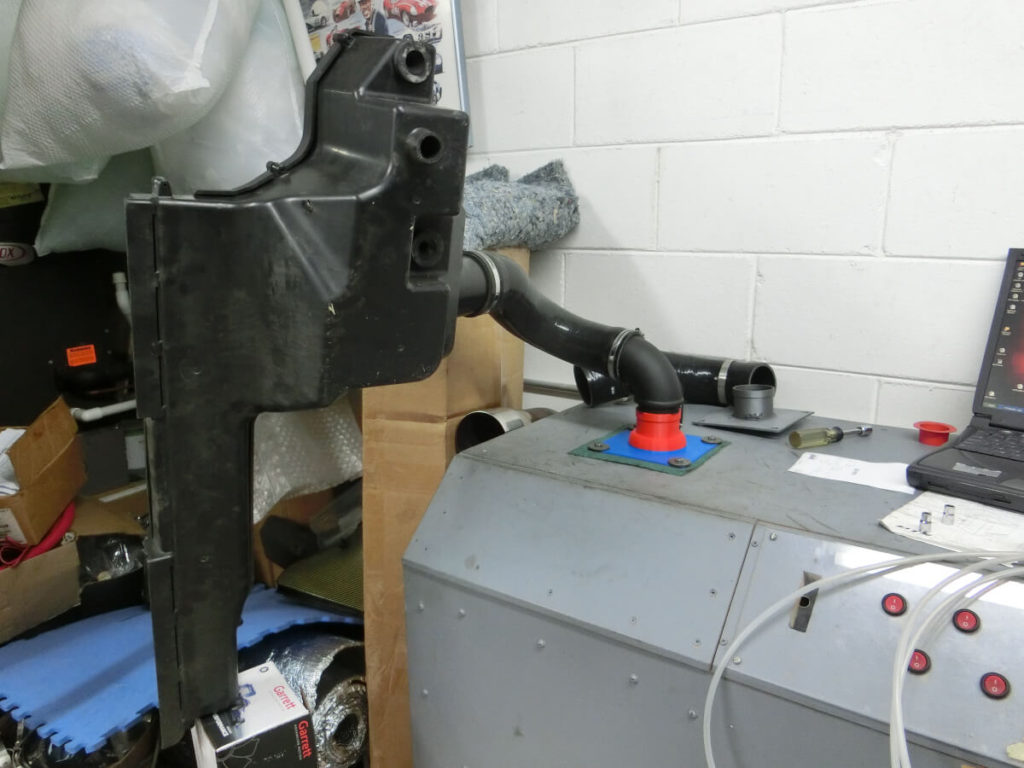Background:
A comment referencing the flow performance of the R600 intake versus another option reminded me of an “issue” I come across concerning interpreting the flow test results that I post. Comparisons are referenced as though they are absolutes but the intakes are tested joined with inlet hoses and turbo inlet elbows using an adapter to attach the intakes to the flow bench.
All of the parts that attach to the intake do contribute to the overall flow performance. This isn’t too much of a concern as long as the parts remain consistent, but due to the nature of borrowing parts to test that isn’t always practical. Varying the parts that attach to the intake could be a problem if the swapped parts vary substantially in performance so I try to hang onto a few “reference” parts to use.
The MST inlet hose and inlet elbow became a reference set of parts, 6 months after I had tested the R600 intake. This meant that that the R600 intake had been tested using a “generic” inlet elbow, something that represented typical performance.
Back to the “issue” I came across of interpreting the flow results, the results were quoted as though they are absolutes, not accounting for the various mix of parts that are in use, in the case that caught my attention the R600 using a generic turbo inlet pipe (TIP) was compared to another intake that had the benefit of a slightly higher flowing MST TIP.
I decided I would retest the R600 intake and pair it with the current top performing stock size inlet elbow, the 034 Motorsport TIP.
In the comparison of the 034 Insuction bundle and MST inlet hose kit the performance of the two was very similar. The question now became, how would the R600 intake perform if attached to a top performing inlet elbow rather than an average performing one.
Test Procedure:
The intake is tested in the same manner other intakes have been. The intake is attached to the Racingline intake hose and the 034 Motorsport turbo inlet elbow and the setup is attached to the flow bench using an adapter that simulates the compressor housing of the IS20/IS38 turbochargers.
Airflow through the intake is then measured at a test depression of 28″ of H2O.
Prior to any testing the flow bench is checked with a calibration plate to verify the readings are accurate.
Test Results:
The R600 intake previously was tested using a new cotton air filter, the Racingline hose, and a generic inlet elbow. The previous test was also done using a different adapter, a Gray one, that I have determined flows a few CFM more than the current adapter, a Red and Blue one. During that prior test the intake flowed 395 CFM.
For this test I ran through a few different configurations to show how small changes can affect the outcome.
The results are summarized in the chart.
Conclusions:
Changing the parts that are joined with the intake can produce small changes to the flow bench airflow measurements.
It is difficult to test all intakes using the same parts due to a desire to keep a minimum inventory in my garage. Another challenge arises when “better” flowing parts are tested at a later time, putting previously tested parts at a disadvantage.
The largest difference measured was 7 CFM @ 28″ of H2O, this equates to approximately 0.03 psi difference in pressure drop.
When comparing intake flow test results it is important to account for the parts they are attached to, and the adapter being used.
It is also useful to consider the scale of the measures, 7 CFM may seem like a modest difference, while 0.03 psi seems much smaller.



